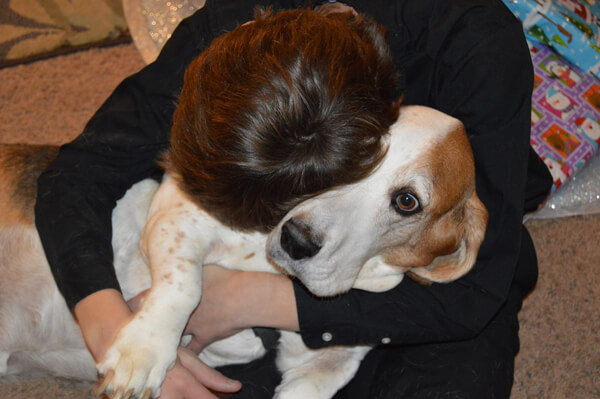- Home Page
- About Us
- Services
- Blog
- Canine Motion Sickness
- Make a Disaster Plan for Your Pets
- Spay Neuter Pet Care 101
- Bringing Your New Dog Home
- Heartworm
- Gotta Get Those Annual Exams
- January is National Train Your Dog Month
- Socialization
- Pet Dental Care
- New Study on Benefits of Rabies Vaccination in Dog
- Halloween Pet Safety - More Boo Less Boo Hoo
- The Best Pet Gift Ever
- Walking Is Healthy for You and Your Pet
- Health Benefits with Pet Ownership
- Canine Parvovirus
- Cold Weather Pet Safety
- First Aid Tips for Pet Owners
- hazards brochure
- Dog Bite Prevention
- Pet Care Resources
- Promotions
- News
- VitusVet
- Hill's to Home
- Request an Appointment
- Contact Us
 |
|
Bethel Animal Hospital
(470)297-5800
www.bethelanimalhospital.net
Preparation and Patience Are Key to Building a Happy Relationship The key to helping your new dog make a successful adjustment to your home is being prepared and being patient. It can take anywhere from two days to two months for you and your pet to adjust to each other. The following tips can help ensure a smooth transition. First, Gather Your Dog’s Supplies Prepare the things your dog will need in advance. You’ll need a collar and leash, food and water bowls, food, and, of course, some toys. And don’t forget to order an identification tag right away. Establish House Rules in Advance Work out your dog-care plan in advance among the human members of your household. Who will walk the dog first thing in the morning? Who will feed him at night? Will Fido be allowed on the couch, or won’t he? Where will he rest at night? Are there any rooms in the house that are off-limits? Plan Your Dog’s Arrival Try to arrange the arrival of your new dog for a weekend or when you can be home for a few days. Get to know each other and spend some quality time together. Don’t forget the jealousy factor – make sure you don’t neglect other pets and people in your household! Be Prepared for Housetraining Assume your new dog is not housetrained, and work from there. Read over the housetraining given to you at the time of adoption and check out our housetraining tips for puppies or adult dogs. Be consistent and maintain a routine. A little extra effort on your part to come home straight from work each day will pay off in easier, faster housetraining. Make Sure All Your Pets are Healthy Animal shelters take in animals with widely varying backgrounds, some of whom have not been previously vaccinated. Inevitably, despite the best efforts of shelter workers, viruses can be spread and may occasionally go home with adopted animals. If you already have dogs or cats at home, make sure they are up-to-date on their shots and in good general health before introducing your new pet. Take your new dog to the veterinarian within a week after adoption. There, he will receive a health check and any needed vaccinations. If your dog has not been spayed or neutered, make that appointment! There are already far too many homeless puppies and dogs; don’t let your new pet add to the problem. Most likely, the shelter will require that you have your pet spayed or neutered anyway. Give Your Dog a Crate A crate may look to you like the canine equivalent of a jail cell, but to your dog, who instinctively likes to den, it’s a room of his own. Of course, you won’t want to crate your dog all day or all night, or he will consider it a jail cell. Just a few, regular hours a day should be sufficient. The crate should not contain wire where is collar or paws can get caught and should be roomy enough to allow your dog to stand up, turn around, and sit comfortably in a normal posture. If a crate isn’t an option, consider some sort of confinement to a dog-proofed part of your home. A portion of the kitchen or family room can serve the purpose very well. (A baby gate works perfectly.) Use Training and Discipline to Create a Happy Home Dogs need order. Let your pet know from the start that you are in charge around here. When you catch him doing something he shouldn’t, don’t lose your cool. Stay calm, and let him know immediately, in a loud and disapproving voice, that he has misbehaved. Reward him with praise when he does well, too! Sign up for a local dog training class, and you’ll learn what a joy it is to have a well-behaved dog. Also, be sure to read our tip sheet on training your dog with positive reinforcement. Let the Games Begin Dogs need an active life. That means you should plan plenty of exercise and game time for your pet. Enjoy jogging or Frisbee? You can bet your dog will too. If running around the part is too energetic for your taste, try throwing a ball or a stick, or just going for a long walk together. When you take a drive in the country or visit family and friends, bring your dog and a leash along. Be Patient and Enjoy the Results Finally, be reasonable in your expectations. Life with you is a different experience for your new companion, so give him time to adjust. You’ll soon find out that you’ve made a friend for life. No one will ever greet you with as much enthusiasm or provide you with as much unqualified love and loyalty as your dog will. Be patient, and you will be amply rewarded. Compliments of The Humane Society of the United States, 2018. |







